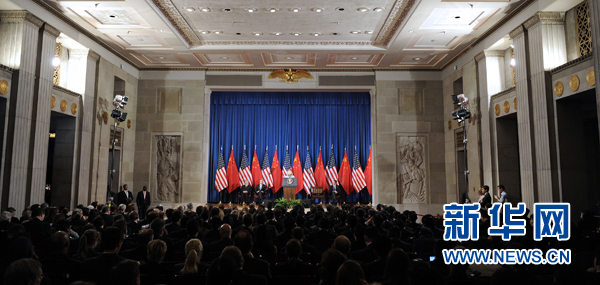Shared interests highlighted
|
The third annual US-China Strategic and Economic Dialogue (S&ED) is held at the Department of the Interior in Washington May 9, 2011.[Xinhua] |
Dai made an evocative speech highlighting that cooperation between the two countries will benefit future generations.
"I am standing here addressing you as a 70-year-old man, an age when I should enjoy the company of my children and grandchildren ...
"I am doing this (attending the meeting) to implement the consensus of our presidents for the achievement of one lofty goal, to make our two countries and people forever good friends and good partners, and to enable our children and children's children to live in peace and happiness. Could we ever let them down? The answer is a definite no."
Both sides, for the first time, brought top military leaders to the talks in an effort to defuse tension following US arms sales to Taiwan last year.
After the opening session, the two sides will break into separate discussions on the economy and foreign policy. The US and Chinese leaders were also scheduled to meet US President Barack Obama on Monday. The talks wrap up on Tuesday.
America's massive trade deficit with China, currency rates and human rights concerns are expected to be on the agenda.
Meanwhile, China, as the biggest foreign creditor, wants assurances that its $1.2 trillion in US Treasury holdings are safe despite the impending congressional debate over raising the government's $14.3 trillion borrowing limit.
"The Chinese are astounded that the US government would let the debate get to the stage where there is even a remote possibility of a default," said Eswar Prasad, a China expert at Cornell University.
The higher debt limit is needed to make sure America can keep paying the interest bill on the debt to China and other investors.
While Geithner said last week that the US would press China to accelerate efforts to revalue the yuan, he had sounded a conciliatory tone prior to the talks. He noted that the yuan had risen in value by 5 percent since last June, and even faster once inflation was taken into account.
Sun Zhe, director of the Center for US-China Relations at Tsinghua University, said the US is mainly concerned about the yuan exchange rate, innovation, intellectual property rights and government procurement.
China's concerns include the US ban on the export of high-tech products and the granting of market economy status.
Sun said as the coming three to five years are an important period for both countries, "how to enhance their communication and drive the world economy with their own development will be major themes in the talks".
Senior Colonel Li Jie, a researcher at the Chinese Navy's Military Academy, told China Daily that future high-level military talks, maritime security cooperation, and regional security will probably dominate the first military dialogue.
Beijing has repeatedly protested against surveillance by US military planes and ships in waters near China.
Discussions between senior military representatives will "help reduce the chances of conflict", Li said.
Go to Forum >>0 Comments
 Add your comments...
Add your comments...
- User Name Required
- Your Comment
- Racist, abusive and off-topic comments may be removed by the moderator.
 0
0 







